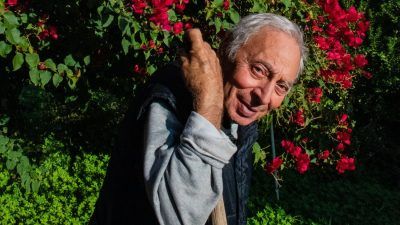6 Nutrition Tips for Healthy Ageing

Although we can’t stop the ticking of time or the increasing number of candles on our birthday cake, we can actually slow the ageing process – or rather, age more healthily. Many people think it’s inevitable that as we grow older, we lose vitality, become frail and inactive. But as vegetarian George Bernard Shaw said, “We don’t stop playing because we grow old; we grow old because we stop playing.” Despite the truth in this statement, our body and its needs do change as we age. So, if you want to continue playing into older age, here are six nutrition tips to keep you, not only young at heart, but young at body too.
1. Healthy bones
One of the big physical changes as we age is a decreasing level of sex hormones, which stimulate bone maintenance amongst other functions. When they reduce, we need to make sure our diet is the best it can be to protect our bones. To maintain healthy bones, we need to make sure we’re getting enough of three things: resistance exercise, calcium in our diet, and vitamin D.
Resistance exercise is the single biggest thing we can do to maintain strong bones in later life. From middle-age our bone density starts to decrease, so strength exercise three or four times a week is essential. This can be simple body weight exercises done at home (see Dr Chatterjee’s 5 Minute Kitchen Workout here) or you can use resistance bands and weights if you have them.
Eat plenty of foods rich in calcium, magnesium, vitamin K and other nutrients essential to healthy bones. The best sources are:
- Green leafy vegetables – kale, broccoli, rocket, spring greens, Brussels sprouts and watercress
- Figs (dried or fresh), oranges, tangerines
- Calcium-set tofu (look for calcium sulphate in the ingredients)
- Calcium-fortified plant milks and cereals
Vitamin D is just as important for healthy bones. Its main source is sunshine on bare skin which triggers vitamin D production in the body. However, in autumn and winter there isn’t sufficient sunshine and it’s not strong enough, while in spring and summer we often cover up or use sunscreen so we still don’t get enough. The UK government recommends that we take a vitamin D supplement during the winter months and all year round if we cover up in summer – a dose of 10 micrograms (400 IU) is all we need.
2. Maintain muscle mass
Once we hit middle-age it becomes harder for our bodies to gain and maintain muscle mass. This natural process is known as sarcopenia. It can result in frailty and an increased risk of injury from knocks and falls. Although it is a totally natural phenomenon, there are still things we can do to limit the process. As well as the exercise mentioned above, we need to eat enough protein.
There is plenty of protein in a healthy vegan diet but an unbalanced diet may be lacking it and we need even more as we age. Many older people fail to eat enough protein, favouring carbohydrates a bit too much. Foods such as bread, rice, potatoes, cakes and pies may take centre stage, along with some fruit and veggies, while protein-rich foods lag behind.
Include a good protein source at every meal – lentils, beans, chickpeas, tofu, tempeh, edamame, mock meats and seitan, nuts or seeds. If you struggle with appetite, an additional protein shake may be a good option – but don’t use it to replace meals.
3. Healthy brain and nervous system
A failing memory or cognitive decline is absolutely not inevitable as we age. Although genetics can play a part, it is often a symptom of lifestyle choices such as reduced intellectual stimulation, a build-up of oxidative stress over time (from environmental factors), and inadequate nutrition.
One such nutritional deficiency is a lack of B12. Vitamin B12 deficiency may look a little like the mental decline that some expect in old age – memory problems, brain fog, low energy or various pains and tingling throughout the body. It’s more common in older adults than you may think so don’t underestimate it. See Viva!’s B12 recommendations here.
In addition, to combat oxidative stress, eat plenty of colourful fruits and vegetables and dark leafy greens rich in antioxidants. And we mustn’t forget omega-3 fats found in flaxseed and walnuts, which we need to keep our brain healthy.
4. Healthy heart
Eating wholegrains and avoiding white flour products (refined carbohydrates) can have a bigger health effect than you may think. Wholegrains keep you regular thanks to all the fibre they contain, they’re a good source of B vitamins, some minerals and protein, but there’s another reason why you should eat them – wholegrains protect your heart health, lowering your cholesterol and blood pressure, while white flour products can make matters worse.
Wholegrains are foods such as wholemeal bread, brown rice, oats, wholewheat pasta, quinoa or buckwheat – eat plenty of them! On the other hand, avoid white bread, pastries, pies, white flour biscuits or crackers.
5. Healthy appetite
Loss of appetite is common in older age and again raises the issue of poor nutrition. If low appetite isn’t caused by an illness or medication, it may result from a lack of exercise. You don’t need to take up running, a brisk walk can nicely boost your appetite! In other cases, appetite loss may be linked to dehydration so make sure to drink enough water or tea. Both hydration and exercise are great for the digestive system because they, quite literally, keep things moving.
If you have difficulty chewing or other dental problems and you can only eat soft foods, you are likely to reach a point where you just lose interest. To remedy this, experiment with different flavours, textures and food combinations – there are bound to be some winners there! Boost the nutrient content of soups and smoothie with tahini or nut butters.
6. Reduce unhelpful inflammation
Two common problems in older people are joint pain and breathing difficulties. These issues may seem unrelated but they can both have the same thing in common – inflammation of the tissues. It may be necessary to take medication, but food can also help.
An antioxidant-rich diet is known to reduce inflammation in the airways and joints, reducing bothersome symptoms. Eat at least five portions of fruit and vegetables daily and bear in mind that those with the richest colours – dark green, red or orange – contain the most antioxidants. The huge plus is that they are also excellent for your immune system!
Although many of us might wince with the discovery of a new wrinkle or a greying hair, getting older doesn’t have to stop us from leading active and fulfilling lives – especially if we follow these suggestions. And you don’t have to believe me – just ask Mike Fremont, a 100-year-old vegan marathon runner who is still setting world records!







